Experts are divided over the hugely controversial topic of vaccinating children, given their tiny risk of dying or falling seriously ill.
Some countries — including the US and Israel — began months ago, which made Britain an outlier in so far only vaccinating the most vulnerable over-12s.
Now the UK has U-turned to fall in line, with scientists advising the Government now saying it will help to head off any autumn surge by stopping schools becoming hotbeds for transmission when children return to classrooms in September.
But the move has prompted fierce debate among the country’s top scientists.
Some academics are concerned any risks of the vaccine — which are rare — may slightly outweigh any benefits because the overwhelming majority of infected youngsters escape serious illness.
The Joint Committee on Vaccination and Immunisation (JCVI), which advises No10, used the delicate risk/benefit ratio to advise against routinely dishing out Covid jabs to all children just two weeks ago, when the expert panel last reviewed the evidence.
Other critics of the JCVI’s reversal — which was confirmed this afternoon— argue spare doses should be sent to poorer countries, which are lagging massively behind in their roll-outs.
Professor Anthony Brookes, a geneticist at Leicester University, described the Government’s drive to vaccinate children as an ‘obsessive ratchet’ and said 12-year-olds could be ‘the next target’. The JCVI will continue reviewing data before pressing ahead with any move to jab younger children.
However, advocates for vaccinating children warn it will be impossible to achieve any kind of population immunity without inoculating under-18s.
One top expert told MailOnline they were ‘annoyed’ and believed the programme should have started sooner. And a group of hardline scientists — representing Independent SAGE — called the delay ‘unacceptable’, arguing it was ‘too little, too late’.
The major safety concern surrounding giving Covid vaccines to children centres around a heart condition called myocarditis, which UK regulators accept is a potential side effect of Pfizer’s jab — which will be the only one given to youngsters for now.
The issue is much more common after the second dose, which has prompted UK health chiefs to only commit to giving 16 and 17 year olds their initial jab. Regulators are waiting for more safety data before pressing ahead with plans to give them a top-up.
Data from the US suggests that there are 9.8 cases of myocarditis reported among 12 to 17 year old boys for every million first doses given. This rises to 67 per million after the second dose.
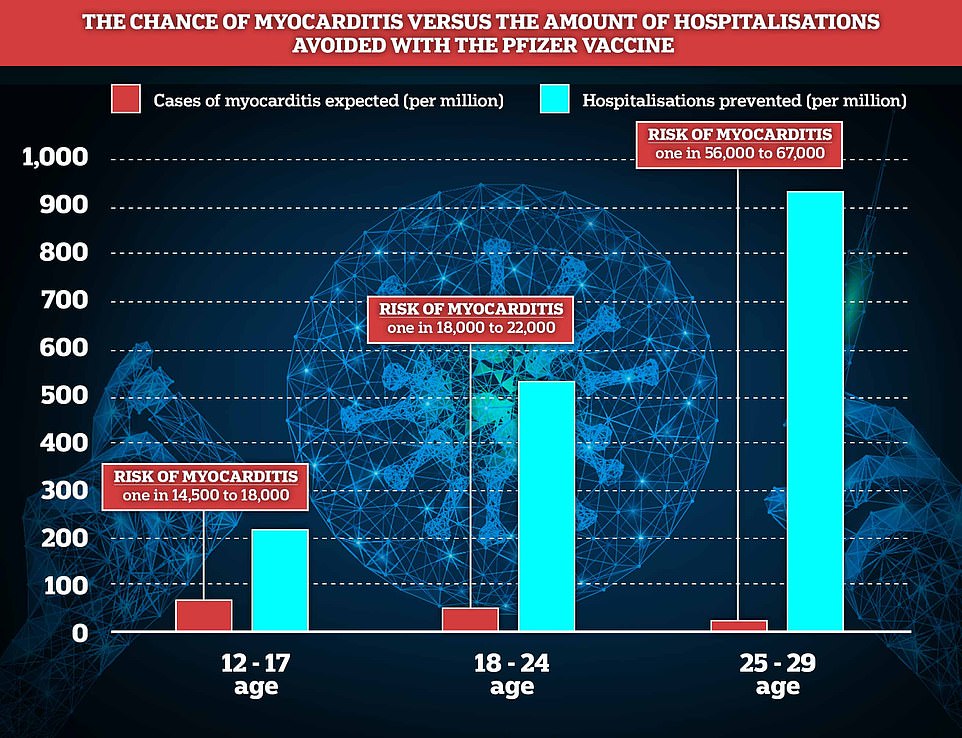
Around one in 14,500 12- to 17-year-olds given two doses of Pfizer’s or Moderna’s mRNA-based vaccines are thought to develop the rare heart condition myocarditis, according to the Centers for Disease Protection and Control (CDC). However the proportion of children who are saved from being hospitalised after both doses is higher in all age groups
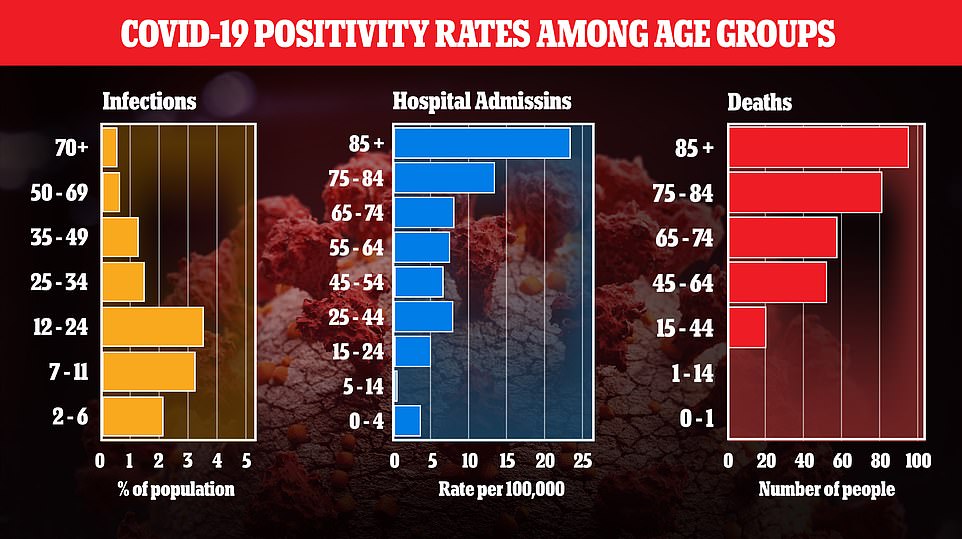
While infections are significantly higher in younger age groups in the UK, hospitalisations and deaths from Covid are far lower in youngsters despite them not having received the vaccine

Chart shows: The proportion of hospital admissions in each age group. Just 1.1 per of all people admitted to hospital with Covid since England were newborns to five-year-olds and only 0.8 per cent were aged six to 17
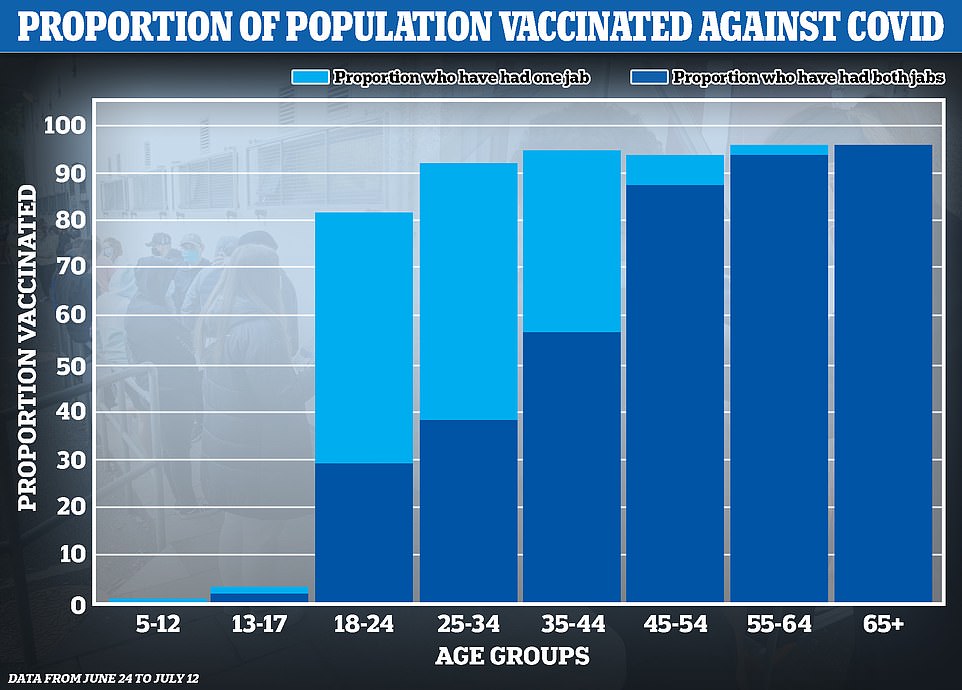
Graph shows the proportion of people in each age group who had received one Covid jab (light blue) and who were fully immunised (dark blue)
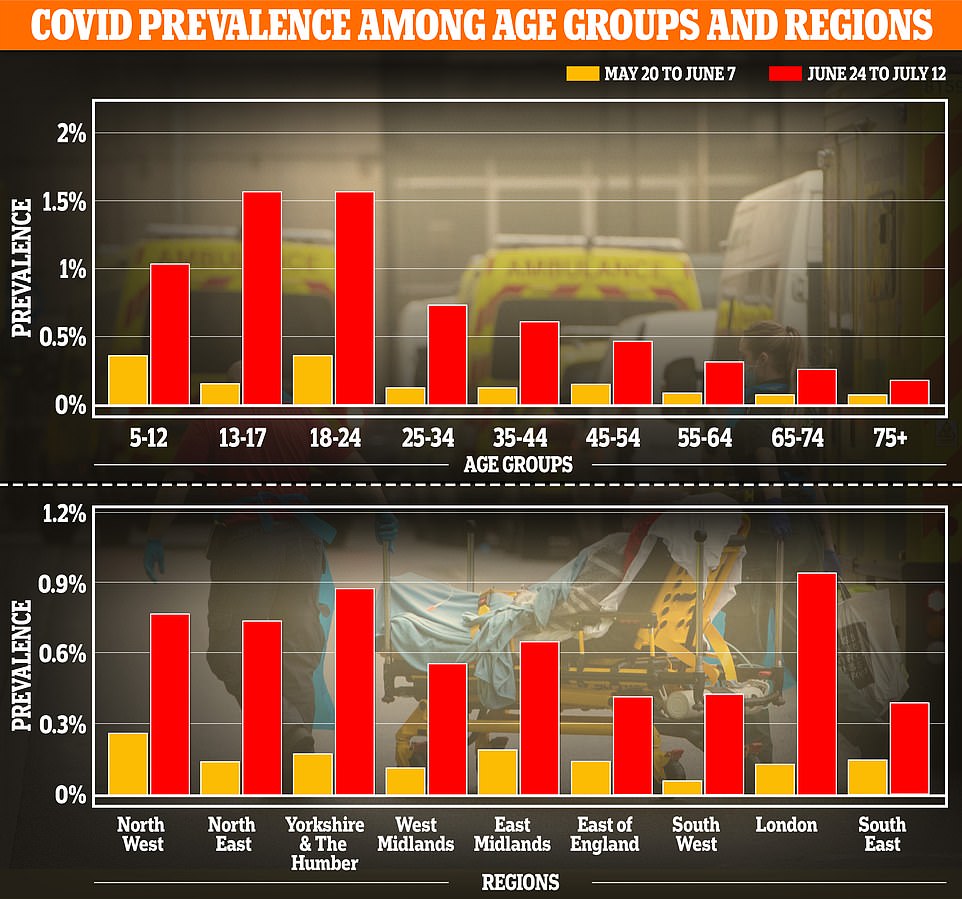
Top graph: Data from June 24 to July 12 (red bars), gathered by Imperial researchers as part of the REACT study, shows that infection rates were highest in five to 24-year-olds. Half of all Covid infections were in this group, despite them making up just 25 per cent of the population. Nine times more children aged 13 to 17 tested positive in the most recent testing window compared to rates from May 20 to June 7 (yellow bars). Bottom graph: Figures also show that infection rates were highest in London, where 0.94 per cent tested positive by July 12, up from just 0.13 per cent in the previous study period
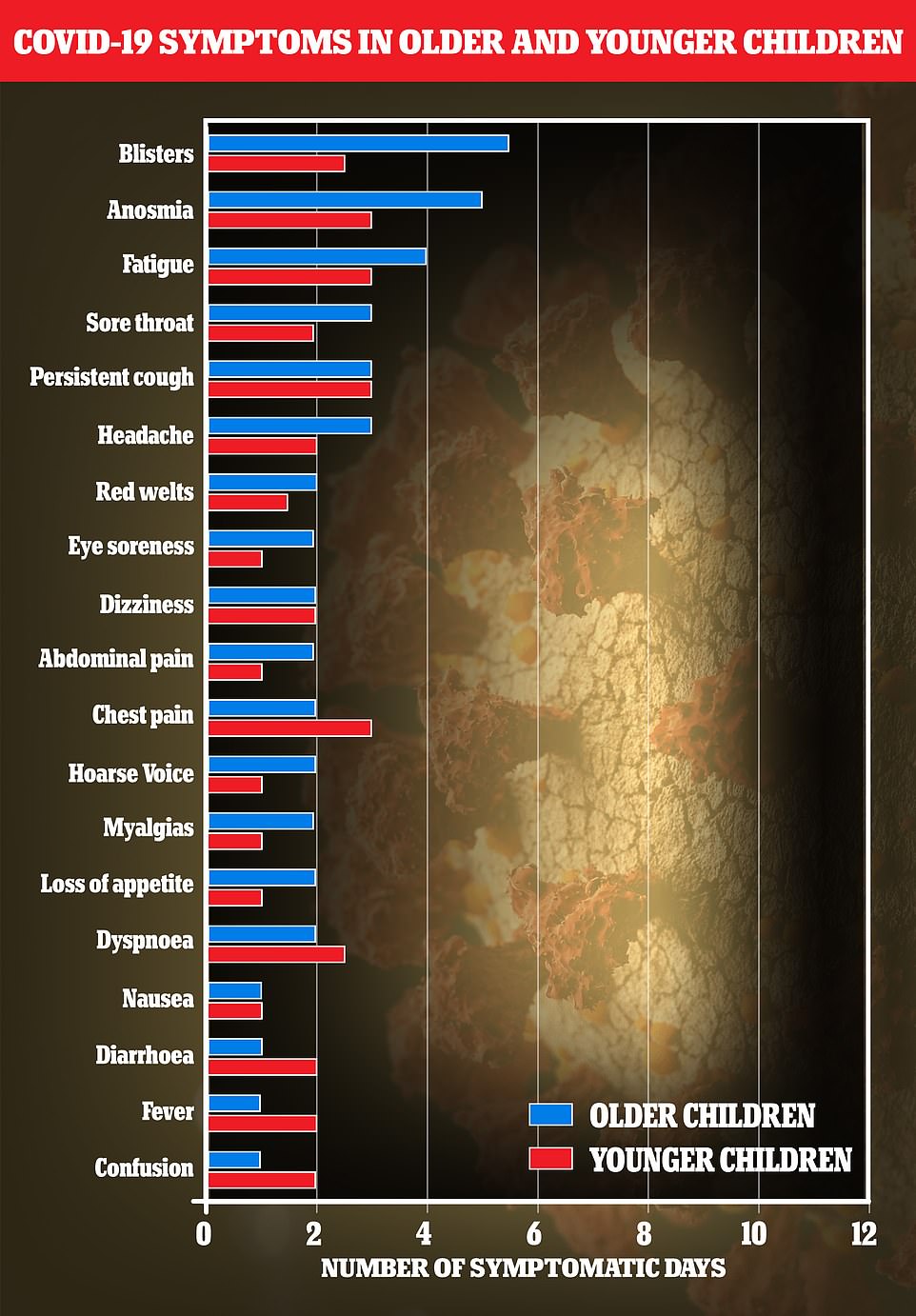
While little is known about the effects of long Covid on children, a study by Imperial College released today showed most symptoms in older (12- to 17-year-olds) and younger (12-year-olds and younger) children clear up before six days

Some experts say vaccine doses should be sent to more vulnerable adults in poorer countries, which are lagging massively behind in their roll-outs, before they are used on children here. Graph shows: The proportion of adults given first doses (orange + green) and second doses (orange) in countries around the world
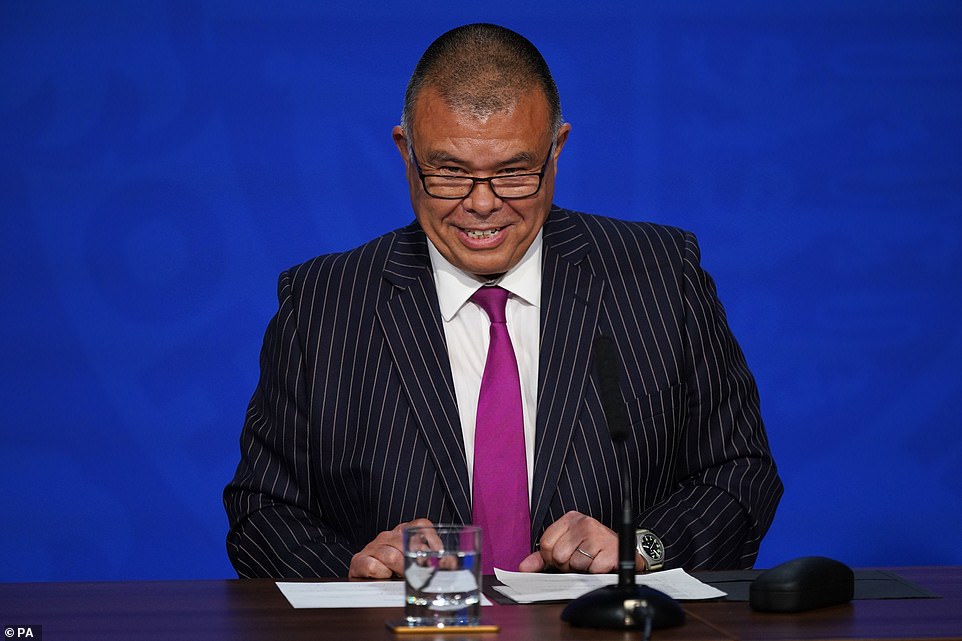
Professor Jonathan Van-Tam, deputy chief medical officer for England, today announces 16- to 17-year-olds will be given the vaccine
Schools should not be responsible for promoting or policing jabs for pupils, union says
Schools should not have any responsibility for promoting, enforcing or policing vaccination of pupils, a union has said.
School leaders’ union NAHT said UK policy on jabs for children should be led by clinicians.
Paul Whiteman, NAHT general secretary, said: ‘The debate about whether or not to vaccinate older children has been raging for many weeks. NAHT has always said that UK policy on child vaccination should be led by clinicians.
‘To the extent that any such policy is controversial it is clear that schools should not carry any responsibility for vaccination promotion, enforcement or policing.’
He said Covid remains a worry for school leaders, given the large numbers of absences related to the virus last term.
A record 1.13million children in England were out of school for Covid related reasons towards the end of term, recent Government figures showed.
The figures included 994,000 children self-isolating due to a possible contact with a Covid case, 48,000 pupils with a confirmed case of coronavirus, and 33,300 with a suspected case.
A further 50,700 pupils were off as a result of school closures due to Covid-related reasons, the Department for Education (DfE) statistics showed.
Mr Whiteman said: ‘Regardless of the extent that young people might suffer directly from the virus, the large numbers of pupils absent from school at the end of last term showed that Covid still has the power to affect the quality and continuity of the education they receive.
‘That is a continuing worry for school leaders.
‘Pupils will return to schools next month, and the Government needs to take every possible step to prevent transmission of the virus amongst people in school communities, no matter their age.
‘As ever, it will be a matter of public confidence in whatever these measures are deemed to be, so the Government also has a duty to communicate carefully and clearly in order to avoid any more unnecessary disruption and missed education for pupils.’
Geoff Barton, general secretary of the Association of School and College Leaders (ASCL), said extending the jabs rollout would reduce disruption to schooling.
He told the BBC Radio 4 Today programme: ‘Anything that gives the reassurance to young people that they are being treated in the way that the adult population is and that their education won’t be disrupted to the extent it has been – that has to be welcomed.
‘I’m sure many parents, with their youngsters, will think at last we’re starting to give a real sense of priority to young people’s education.’
He said generally he thinks ‘young people feel they’ve been let down educationally’.
He added: ‘If this is one way we can get rid of that disruption I think we will see a great sense of a lot of young people, not all, but a lot of young people thinking, ‘Actually, I’m going to have the vaccine, just like my mum or my dad has’.’
Mr Barton suggested vaccination for younger pupils could also be considered.
Advertisement
But US officials, who’ve been investigating the link between the jabs are the rare complication for months, say the benefits still outweigh the risks, despite clear data showing teenagers are more likely to be struck down.
Around one in 14,500 12-17 year olds given two doses of Pfizer’s or Moderna’s mRNA-based vaccines are thought to develop the condition, according to the Centers for Disease Protection and Control (CDC).
The risk drops to one in 18,000 among 18- to 24-year-olds. But it plunges even further for over-30s, with rates of just one in 250,000.
But the US agency has not clarified exactly how much more often myocarditis is occurring, so it is not clear exactly how much risk is posed by the vaccine.
In real terms, they expect to see between 56 and 69 cases of myocarditis per 1million doses given out among the youngest age group. Under the same circumstances, just two deaths will be prevented — with Covid-infected children facing roughly a one in 500,000 risk of dying.
However, in a clear sign that the vaccines would have some benefit, more than four times as many hospitalisations were prevented as there were cases of myocarditis caused by the vaccine in 12- to 17-year-olds, the CDC’s data show.
Vaccines — which are proven to be life-saving and have a tiny risk of serious side effects in rigorous analyses — have already saved tens of thousands of lives in Britain, researchers estimate.
Covid poses the greatest threat to the elderly, meaning the risk/benefit ratio of vaccines is clearly one-sided for the oldest adults.
But a clear trend in how dangerous Covid is as people get older has led to difficult decision who to vaccinate, especially given the jabs do carry some side effects — albeit extremely rare ones.
For example, UK health chiefs recommended under-40s should alternative jabs to those produced by AstraZeneca, after the British-made vaccines were linked to ultra-rare blood clots.
At the time, infection rates were low, skewing the risk ratio against the company’s jab. Experts always said that if Covid took off again, the algorithm could change.
Now that Covid is highly prevalent in the UK, some say any conversations about the close risk/benefit ratio is in favour of vaccines.
But cases have actually started to fall in Britain since the JCVI announced its previous advice on jabbing children, prompting question as to whether the panel was ‘bounced’ into the move.
Now scientists want the JCVI to release evidence justifying its decision, in particular why doses are not being offered to 15-year-olds.
Experts and MPs criticised No10’s plans to ease lockdown last month by warning long Covid could become rife in youngsters.
But the poorly-understood condition is rare among youngsters, a major study revealed last night. Fewer than two per cent still suffer symptoms eight weeks after getting infected.
Yet some of the country’s top scientists say it is crucial to vaccinate children because the true extent of long Covid remains a mystery, especially among youngsters.
Meanwhile, new Office for National Statistics (ONS) research released today left experts even more divided.
It showed nearly 60 per cent of 16 to 17 year olds have Covid-fighting antibodies, suggesting the group already have high levels of immunity.
The data suggests little need to vaccinate children according to some experts.
But Professor Paul Hunter, an infectious disease expert at the University of East Anglia, claimed it may still be the ‘correct option’ even though most in this age group will already be immune.
Professor Jonathan Ball, a molecular virologist at the University of Nottingham, said immunity from natural may be short-lived, if SARS-CoV-2 is anything like other seasonal coronaviruses.
As plans to vaccinate children in the are due to be unveiled by No10’s scientists, MailOnline asked the experts whether teenagers really need to be vaccinated.
The Pros

Dr Bharat Pankhania, a clinical lecturer in public heath at the University of Exeter Medical School, says the rollout should have been extended to youngsters far earlier
Dr Bharat Pankhania
Public health expert at the University of Exeter
Dr Bharat Pankhania, a clinical lecturer in public heath at the University of Exeter Medical School, said the roll-out should have been extended to youngsters far earlier.
He told MailOnline that while Covid does not pose a large threat to children themselves, they can act as ‘agents’ of transmission, keeping levels of the virus high in wider society and infecting vulnerable adults.
Dr Pankhania added that while initial infection may not be severe in children, the threat of long Covid would be curbed by vaccines.
And he said having core immunity in both adults and children would help protect against future variants that may emerge.
He told MailOnline: ‘I am so pleased [the rollout has been extended] and I feel I was right and the JCVI was wrong. I’m annoyed, as they should have started it sooner.
‘The vaccine rollout should be expanded further to 12-year-olds and over. It’s disappointing that the UK is doing it in smaller groups.
‘If the vaccine is found to be protective in youngsters, then there is no harm whatsoever in having some vaccine protection in the population – we do that with flu jabs, where we vaccinate youngster to protect older groups.
‘I hope the Government will further expand the vaccine rollout, but I have feeling we are not being told the full reasons for just vaccinating over-16s. It may be a supply issue and if it is, it’s still better to honestly say that and explain when it is fixed we will have more vaccinated. But that is just speculating.’

Dr Stephen Griffin says vaccinating children will protect them as well as vulnerable adults and the jab should be rolled out to younger groups
Dr Stephen Griffin
Head of antivirals and viral oncology at the University of Leeds
Dr Stephen Griffin told MailOnline vaccinating children will protect them as well as vulnerable adults and the jab should be rolled out to younger groups.
The virus expert from the University of Leeds said: ‘It’s been approved in 12 and over and I would love to see those groups getting it as well.
‘The numbers the JCVI used to reach its decision have not been released, but I can’t see a big different in the risks and benefits for 15-year-olds compared to 16-year-olds. Other countries have used the wider group of those aged 12 to 17. You don’t want to vaccinate arbitrary groups and I worry they have decided on over-16s to allay different groups.
‘What’s the point in having just half of secondary school covered? They should be thinking about preventing cases and not take the risk.
‘Regardless of what proportion of children get severe disease, there have been thousands of children in hospital with the virus. A small proportion of a very large number is still a big number, so it is not just about protecting others.’
He added: ‘But vaccinating children to protect others is not a bad thing.
‘Some children will be living with vulnerable adults who can’t get the vaccine and what are they supposed to do when their children go back to school?
‘The risk of unvaccinated children going back to school in September is higher than last year because they have got rid of bubbles and are relying on contact tracing. They have also not made progress on ventilating school buildings in England.
‘We should not underestimate the risk of myocarditis and other possible long-term side effects, but the incidence is so low and mild most of time. The US has vaccinated 9million children and its myocarditis rates are so low. So, the benefits far outweigh the risks.’
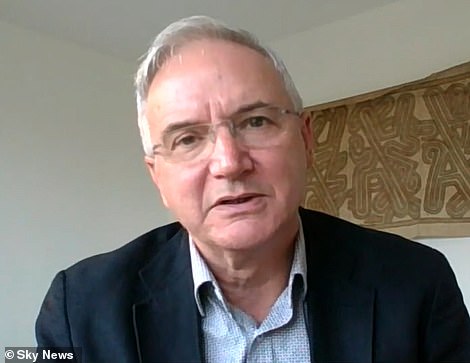
Professor Peter Openshaw says Covid transmission in children and teenagers is the highest of any age group and vaccines could help curb the rampant spread in youngsters
Professor Peter Openshaw
Experimental medicine expert at Imperial College London
Professor Peter Openshaw said Covid transmission in children and teenagers is the highest of any age group and vaccines could help curb the rampant spread in youngsters.
He said: ‘Infections are generally mild but some are not. Both the short and long-term effects of Covid can seriously disrupt education and leisure.
‘Teenagers have not had the benefit of being naturally infected in early childhood and therefore have no immunological resistance to infection with highly transmissible variants.
‘Estimates of the proportion of young people affected by long Covid varies, but symptoms range from mild to disabling and Covid may present in unfamiliar ways in childhood.
Professor Openshaw, an experimental medicine expert at Imperial College London, added: ‘The information that we have so far shows that vaccines are highly effective and safe in childhood and adolescence.
‘There are reports of rare cases of myocarditis and pericarditis in young males after mRNA vaccines, but the reasons for this and the frequency has yet to be proven.
‘JCVI are right to continue to monitor safety data from UK studies and from other countries, balancing risks and benefits of vaccination versus natural infection at different ages.
‘Vaccination of teenagers may have a major effect on the return of Covid next winter, assuming that the rates will drop this summer.
‘Full vaccination takes time, so the sooner we start the sooner this age group will be protected.’
The Cons

Professor Robert Dingwall told MailOnline the risk-benefit for vaccinating children is ‘increasingly precarious’ as you move down the age groups
Professor Robert Dingwall
Medical sociologist at Nottingham Trent University
Professor Robert Dingwall, a sociologist at Nottingham Trent University, told MailOnline the risk-benefit for vaccinating children is ‘increasingly precarious’ as you move down the age groups.
The Joint Committee for Vaccination and Immunisation (JCVI) said vaccines have to be proven to be incredibly safe to be used on healthy teenagers.
He cited a paper in the Lancet today showing that people aged five to 17 suffer serious illness from Covid ‘very rarely’.
Professor Dingwall, a former Government adviser, told MailOnline: ‘The risk-benefit ratio for vaccination compared with infection becomes increasingly precarious as we move down from 30-year-olds into younger age groups.
‘As the Zoe group paper in today’s Lancet shows, Covid very rarely causes a serious illness in 5- to 17-year-olds.
‘This sets a high bar for the safety of vaccines in healthy teenagers.
‘In 2009, JCVI decided not to recommend childhood vaccination against chicken pox precisely because this was such a mild illness.
‘It is important not to overlook that precedent simply because some people think it is desirable to eliminate all possibilities of infection.’

Professor David Livermore told MailOnline vaccinating children aged 16 and 17 against Covid will be ‘pretty pointless’
Professor David Livermore
Medical microbiologist at the University of East Anglia
Professor David Livermore, a medical microbiologist at the University of East Anglia, told MailOnline vaccinating children aged 16 and 17 against Covid will be ‘pretty pointless’.
The medical microbiologist at the University of East Anglia said people in the age group are at very little risk of serious illness from the virus.
He said school age children will have already built up a fair amount of immunity from natural infection and will continue to do so when schools reopen.
Vaccines would therefore be of better use being given to countries where rollouts have not yet reached more vulnerable age groups, he argued.
Professor Livermore said: ‘Sixteen to 17-year-olds are at low risk of serious disease and, through exposure, are developing immunity anyway.
‘We do not know if vaccine-induced or infection-induced immunity will prove the longer lasting, and to the better contributor to herd immunity.
‘Given this I can see no good reason to prioritise vaccinating them.
‘Limited vaccine supplies would be far better used in countries and regions with large vulnerable elderly populations who presently remain unvaccinated — Australia, much of South East Asia and Latin America, as well as Africa.’

Professor Anthony Brookes says the risks of heart inflammation blood clotting and potential unknown future side effects outweigh the risks of Covid in children
Professor Anthony Brookes
Geneticist at the University of Leicester
Professor Anthony Brookes said the risks of heart inflammation, blood clotting and potential unknown future side effects from vaccination outweigh the harms caused by Covid to children.
The genetics expert at the University of Leicester said the risks of vaccinating young people was recognised by the Joint Committee for Vaccination and Immunisation (JCVI) last month, so the U-turn in policy could have been caused by political pressure from the Government.
Professor Brookes told MailOnline: ‘Serious future harms [of vaccinating children] cannot be ruled out.
‘This compares to the almost non-existent risk of serious harm from Covid for the young.
‘The JVCI recognised these truths and the responsible balance of risks just a few weeks ago.
‘Therefore, many will conclude that political pressure from government to ‘reconsider’ is the only reason JCVI will now be changing their position.
‘So the obsessive ratchet effect continues, and we might well expect 12-year-olds to be the next target, and then everyone down to infants.’
WHAT ARE THE PROS AND CONS OF VACCINATING CHILDREN?
Pros
Protecting adults
The main argument in favour of vaccinating children is in order to prevent them keeping the virus in circulation long enough for it to transmit back to adults.
Experts fear that unvaccinated children returning to classrooms in September could lead to a boom in cases among people in the age group, just as immunity from jabs dished out to older generations earlier in the year begins to wane.
This could trigger another wave of the virus if left unchecked, with infection levels triggering more hospitalisations and deaths than seen during the summer.
Avoiding long Covid in children
While the risk of serious infection from Covid remains low in most children, scientists are still unsure of the long-term effects the virus may have on them.
Concerns have been raised in particular about the incidence of long Covid — the little understood condition when symptoms persist for many more weeks than normal — in youngsters.
A study released last night by King’s College London showed fewer than two per cent of children who develop Covid symptoms continue to suffer with them for more than eight weeks.
Just 25 of the 1,734 children studied — 0.01 per cent — suffered symptoms for longer than a year.
Cons
Health risks
Extremely rare incidences of a rare heart condition have been linked to the Pfizer vaccine in youngsters.
Data from the Centers for Disease Control and Protection (CDC) in the US — where 9million 12- to 17-year-olds have already been vaccinated — shows there is around a one in 14,500 to 18,000 chance of boys in the age group developing myocarditis after having their second vaccine dose.
The risk is higher than in 18- to 24-year-olds (one in 18,000 to 22,000), 25- to 29-year-olds (one in 56,000 to 67,000) and people aged 30 and above (one in 250,000 to 333,000).
However, the risks are far outweighed by the benefits of the vaccine and the CDC say myocarditis incidents are extremely rare.
More than four times as many hospitalisations were prevented as there were cases of myocarditis caused by the vaccine in 12- to 17-year-olds, the health body’s data show.
Jabs should be given to other countries
Experts have also claimed it would be better to donate jabs intended for teenagers in the UK to other countries where huge swathes of the vulnerable population remain unvaccinated.
Not only would this be a moral move but it is in the UK’s own interest because the virus will remain a threat to Britain as long as it is rampant anywhere in the world.
Most countries across the globe are lagging significantly behind the UK in terms of their vaccine rollout, with countries in Africa, Southeast Asia and South America remaining particularly vulnerable.
Jabs could be better used vaccinating older people in those countries, and thus preventing the virus from continuing to circulate globally and mutate further, than the marginal gains to transmission Britain would see if children are vaccinated, experts argue.
Advertisement
What Covid vaccine will 16 and 17 year olds get? Will they get jabs in school? And will they need to show parental consent? All your questions answered about the Government’s plan to inoculate 1.5million teenagers
Health chiefs are now set to recommend all 16 and 17 year olds get jabs, marking a dramatic U-turn.
Just two weeks ago the same expert panel — the Joint Committee on Vaccination and Immunisation (JCVI) — advised against doing so.
Boris Johnson is expected to accept the guidance immediately, paving the way for the roll-out to begin later this month.
But experts are divided over the hugely controversial topic of vaccinating children, given their tiny risk of dying or falling seriously ill.
Some countries — including the US and Israel — have already started, which made Britain an outlier in so far only vaccinating the most at-risk over-12s.
As plans to vaccinate children are unveiled by No10’s scientists, MailOnline answers your questions about the roll-out to youngsters.

The Government has not yet given a timeline on when 16 and 17-year-olds can start coming forward for jabs. But even if the roll-out out to older teenagers begin straight away, there will only be time to give them one dose by the time the school year begins on September 6
When will children be vaccinated?
The Government has not yet given a timeline on when 16 and 17-year-olds can start coming forward for jabs.
But even if the roll-out out to older teenagers begin straight away, there will only be time to give them one dose by the time the school year begins on September 6.
Britain’s health chiefs say jabs should be dished out eight weeks apart, in order to give the immune system the biggest boost.
Will jabs be dished out in schools?
Jabs could be administered in schools, like how the HPV vaccine is rolled out for 12 and 13 year old boys and girls.
But Education Secretary Gavin Williamson is expected to push for them to continue to be given at GP surgeries and NHS hubs.
One public health official claimed they could be done either in schools, or in existing vaccination centres at certain times.
What vaccine will youngsters get?
The UK has so far only approved Pfizer’s coronavirus jab for use in children over 12.
Moderna’s vaccine — which works in a similar way — has not been given the green light for youngsters.
AstraZeneca’s injection has been linked to rare blood clots, and health chiefs have already restricted its use to over 40s. Therefore, the British-made vaccine is unlikely to be offered to children.

The UK has so far only approved Pfizer’s coronavirus jab for use in children over 12
Independent SAGE members say plans to vaccinate 16 and 17-year-olds have come ‘too late’
A group of 18 scientists including Independent SAGE members today slammed plans to vaccinate 16 and 17-year-olds as coming too late.
They said it would be impossible to get the group fully inoculated before the start of term because of the required eight-week gap between doses.
The JCVI today announced the Pfizer vaccine would be offered to all 16 to 17-year-olds, in a dramatic U-turn after saying last month it was ethically challenging.
They said the age group would be able to get the first dose, but they were waiting for further data before also approving the second dose.
Concerns have been raised over a very rare heart condition that has been linked to the Pfizer jab. But Britain’s medical regulator says most cases are ‘very mild’ and cured after a period of rest.
Ministers accepted the recommendation, and the NHS is now preparing to dish out the jabs to the younger age groups as soon as possible. They hope to head off a surge in cases expected in the Autumn when schools return.
Independent SAGE expert Professor Christina Pagel said: ‘While it is really good news that 16 and 17-year-olds can now benefit from the protection given by the highly effective vaccine, an opportunity to fully vaccinate students before the start of the next school term has been missed.
‘This same decision even a month earlier would have allowed this.’
Epidemiologist at Queen Mary University Dr Deepti Gurdasani said: ‘The decision from the JCVI is welcome, but the delay in this is unacceptable, given the Pfizer vaccine was approved by the MHRA in 16-year-olds in December, and the benefit vs risk has been clear for a while.
‘The late change means that many in this age group have been infected over the past weeks, with several developing chronic illness, when they could have been vaccinated.’
They have today submitted a paper to prestigious medical journal The Lancet calling on the JCVI to release its analysis that showed jabs could now be dished out to younger groups.
Advertisement
Over-16s are expected to receive two injections eight weeks apart, mirroring how Pfizer’s is given to adults.
Scientists are currently testing nasal spray forms of the Covid vaccine — a method already used to give out children’s flu jabs. But none of the candidates being studied have yet to make it out of trials.
Which countries have already began vaccinating children?
Britain is currently the ‘outlier’, with European countries and the US already giving vaccines to children.
A quarter of children aged 12 to 15 in the US have received two doses, while a third have received one dose.
France, and Spain, Hungary have already starting giving the jab to over-12s, while 10 per cent of children are already vaccinated in Germany.
Meanwhile, Canada, Denmark, Austria, Italy, Lithuania, Estonia, Norway, Switzerland, are expected to start giving youngsters jabs soon.
Israel approved the jabs for over-12s in May and subsequently approved it for 5 to 11-year-olds.
What jabs are they using?
Pfizer has been the go-to jab for vaccinating children around the world.
But Moderna is seeking permission for its jab to be used for over-12s in the EU, US and Canada.
Last week, Italy approved Modern’s jab for use in over-12s.
Have they been trialled on children?
The companies that make the vaccines, as well as other scientists, have studied how safe they are among children.
Pfizer and Moderna found their jab to pose little risk in over 12s and are now trialling the injection in under-11s.
Rigorous analysis also revealed the jabs were effective.
The JCVI said a trial of 1,000 12 to 15-year-olds who received the Pfizer jab found it to be effective and only cause short-term side effects like a fever.
University of Oxford scientists are testing the AstraZeneca jab on children aged six to 17.
So what are the potential risks?
Covid is very rarely severe or fatal in children.
Just one in 500,000 under-18s are at risk of dying from the virus, researchers at leading UK universities found this month.
That means any vaccine given to youngsters has to be very safe because the risk-harm benefit from them catching the virus is so low.
Since the vaccine roll-out has been expanded to children around the world, there have been reports of rare heart conditions: myocarditis and pericarditis.
Myocarditis is the inflammation of the heart muscle, while pericarditis is when the protective layer around the heart gets inflamed.
Data from the US shows those aged 12-17 are at the most risk of developing the heart problem after a Covid jab, compared to other age groups.
Around one in 14,500 to 18,000 children are thought to develop the condition. The risk drops to one in 250,000 among over 30s.
There are no specific causes of the conditions but they are usually triggered by a virus.
The British Heart Foundation says in some cases, myocarditis can affect the heart’s electrical system, stopping it from pumping properly. ‘This can cause an abnormal heart rhythm, known as an arrhythmia,’ it claims.
But British regulators insist the 250 cases seen among Pfizer recipients are ‘typically mild’. Affected patients recover ‘within a short time with standard treatment’.
Will parents have to give consent for the jabs?
One of the most controversial issues surrounding the roll-out to kids is parent’s role in their child’s decision.
Government sources claimed last night that under-18s wanting the jab would have to provide proof of parental consent.
But universities minister Michelle Donelan would not confirm that would be the case when quizzed about the move this morning, merely saying advice from the JCVI was ‘imminent’.
Decision on vaccinating teenagers is balance of risks, say experts
Deciding to vaccinate under-18s against coronavirus involves a balance of risks, experts have said.
Ahead of the announcement on rolling out jabs to 16 and 17-year-olds, scientists said the Joint Committee on Vaccination and Immunisation (JCVI) will have considered the risks and benefits of vaccination at different ages.
Generally if infection risk is low ‘cautionary principles would therefore lead towards avoiding vaccination of teenagers’, said Professor Rowland Kao, chair of veterinary epidemiology and data science at the University of Edinburgh.
But he added that because infections are still fairly high in the UK ‘there remains a substantial risk that teenagers get infected’.
He added: ‘Vaccine side effect risks are, to some extent, counterbalanced by the risk of severe disease which is substantially reduced by vaccination and does sometimes occur in teenagers.’
Although he said both severe jab side effects and severe disease from Covid are rare in teenagers.
With vaccines known to protect against transmission of the virus, he said this could be another reason to recommend older teens are jabbed.
Prof Kao said: ‘While this should not be the primary reason for vaccinating teenagers, it is an additional argument for recommending they do get vaccinated, as, unlike young children, there is good evidence that older teenagers can perpetuate transmission chains.’
Professor Peter Openshaw is a member of the New and Emerging Respiratory Virus Threats Advisory Group (NERVTAG) which advises the Government. He said the evidence so far suggests vaccines are ‘highly effective and safe in childhood and adolescence’ and noted that children are already being vaccinated in the US and France.
He added that because ‘teenagers have not had the benefit of being naturally infected in early childhood’, they will have ‘no immunological resistance to infection with highly transmissible variants’.
Jabbing teens could have a ‘major effect’ on the return of coronavirus in winter, said the professor of experimental medicine at Imperial College London.
He added: ‘JCVI are right to continue to monitor safety data from UK studies and from other countries, balancing risks and benefits of vaccination vs natural infection at different ages.
‘Vaccination of teenagers may have a major effect on the return of Covid next winter, assuming that the rates will drop this summer. Full vaccination takes time, so the sooner we start the sooner this age group will be protected.’
Advertisement
Source link : https://www.dailymail.co.uk/news/article-9859845/Do-16-17-year-old-children-REALLY-need-Covid-vaccines.html











